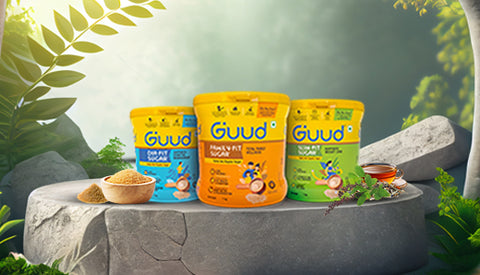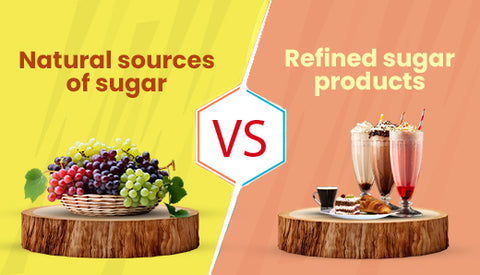Always craving something sweet but not aware of which sugar is good for health? In a world full of sugar options, avoiding daily sweetness cravings is next to impossible, just like Sapna, who has always succumbed to sweet cravings. But isn't it time to be mindful of the type of sugar you're putting into your body? Did you ever think about how it would react in your daily life? If it is dangerous, what type of sugar benefits your health?
Well, there is an answer that we are going to provide to you in this blog. It's time to sift through life's sugar bowl and find the sweetness that enhances, rather than hinders, your health path. You will learn which sugar alternative is best and which sugar is excellent for your health. So let’s begin:
Types of Sugar: Which Sugar is Healthier?
Sugars fall into two types when it comes to sweetness: natural and refined. Natural sugar, the friendly companion, is found in fruits and honey, generously providing not only sweetness but also a variety of nutrients and fiber to the gathering. Refined sugars, on the other hand, may tempt your taste receptors with their sweetness, but they lack the inherent goodness of natural sugars, which makes them much like the troublemakers that disturb the calm. When exploring the sugar landscape, remember to appreciate natural sweetness as a gesture of warmth and nutrition for your collection and overall well-being.
Natural vs. Refined Sugar: What’s the Difference?
When it comes to food, the sweet combination of natural and added sugars often leaves us scratching our heads, wondering, “What’s the real deal?” It is now time to decide which sugar is good for your health!
1. Natural sugars can be found in whole foods, such as fructose in bananas and berries or lactose in skim milk. Added sugar, on the other hand, can be found in doughnuts, sodas, cakes, or added by you.
2. Lactose in milk gives you energy and protein, keeping you full for a longer period of time. While you will not get the same in soda, soda's sugar surge is fleeting and false.
3. Natural sugar has more minerals, is lower in calories, and is high in water content. While added sugar contains few nutrients and can result in raised blood sugar levels, natural sugar is rich in fiber and contains many nutrients that are beneficial for the body, but added sugar is the opposite of it.
4. Moreover, natural sugar is low in calories and has a low GI, preventing you from gaining weight. As a result, additional sugar can lead to weight gain and diabetes.
Sapna used to think that all sugars were the same. She ignored the labels of the products she bought. She did not know the difference between natural and refined sugar. She thought that as long as she ate sweets in moderation, she would be fine. But she was wrong. She started to notice some changes in her body and her mood. She felt tired, irritable, and hungry all the time. She gained weight and had trouble sleeping. She wondered what was wrong with her. She decided to visit a doctor and get some tests done.
Note: Are you aware of what a low GI is? Knowing about low GI can save you, keep you safe from many upcoming diseases, and help you maintain a healthy life!
What Happens When You Consume Too Much Sugar?

Sugar is frequently portrayed as a harmless treat that stimulates our taste senses and triggers our energy levels. However, underlying its sweet attraction lies a harsher truth: excessive sugar consumption can wreak damage on our health, resulting in a chain reaction of unfavorable outcomes.
1. A Sugar High Gone Bad
When we consume sugar, our bodies generate insulin, a hormone that regulates blood sugar levels. However, after an initial burst of energy, the body undergoes a sugar crash, which is characterized by tiredness, irritation, and headaches. This rollercoaster of energy changes can harm our mood, productivity, and overall well-being.
Sapna experienced this sugar high and low cycle every day. She would eat a doughnut for breakfast, feel energetic for a while, and then crash and crave another sweet snack. She would repeat this pattern throughout the day, never feeling satisfied or happy. She felt like she was addicted to sugar and could not stop. She did not realize that sugar was affecting her brain chemistry and making her more prone to depression and anxiety.
2. Gaining weight that will not be controllable
Excess sugar consumption contributes significantly to weight gain and diabetes. Sugary foods are generally high in calories but low in nutrients, resulting in an imbalance in energy intake and expenditure. Furthermore, sugar can interfere with insulin, the hormone that signals fullness, making it more difficult to manage our appetite and contributing to weight gain.
Sapna noticed that her clothes were getting tighter and tighter. She felt bloated and heavy. She tried to exercise and diet, but nothing seemed to work. She did not understand why she was gaining weight, even though she was eating less. She did not know that sugar was messing up her metabolism and causing her to store more fat. She also did not know that sugar was increasing her risk of developing type 2 diabetes, a serious condition that can lead to many complications.
3. Diabetes: A Sugary Nightmare
Excess sugar consumption is intimately connected to type 2 diabetes, a chronic condition characterized by raised blood sugar levels. When our bodies become insulin-resistant, sugar builds up in the bloodstream, causing several health issues such as nerve damage, kidney illness, and heart disease.
Sapna was shocked when her doctor told her that she had prediabetes, a condition where her blood sugar levels were higher than normal but not high enough to be diagnosed as diabetes. She was scared and confused. She did not know what prediabetes meant or how to prevent it from becoming diabetes. She did not know that sugar was damaging her organs and blood vessels and putting her in danger of losing her vision, her limbs, or her life.
4. A Route to Heart Disease
Sugar’s negative consequences go beyond blood sugar regulation. High sugar consumption can cause an increase in triglycerides, a form of fat that increases the risk of heart disease. Furthermore, sugar consumption might contribute to inflammation, which is a feature of cardiovascular disease.
Sapna was unaware that sugar was also affecting her heart health. She did not know that sugar was raising her cholesterol and blood pressure levels and making her blood more sticky and prone to clotting. She did not know that sugar was inflaming her arteries and making them more narrow and hard. She did not know that sugar was increasing her chances of having a heart attack or a stroke.
Note: Do you know that consuming natural sugar decreases the chances of having heart disease? Consuming refined sugar causes the accumulation of fat, which may turn into fatty liver disease, a contributor to diabetes, which raises your risk for heart disease. Click here to discover 10 tips for using natural sugar in a diabetic diet.
How to Identify Natural Sugar?
Sapna was attracted by a note she read on a website. She was curious about how natural sugar could benefit her heart health. She followed the link that explained the difference between natural and refined sugar and discovered some interesting figures.
She learned that natural sugar, such as fructose in fruits and honey, has a lower glycemic index (GI) than refined sugar, such as sucrose in table sugar and high-fructose corn syrup. The GI of a food indicates how quickly it raises blood sugar levels. Foods with a low GI are digested more slowly and cause a gradual rise in blood sugar, which is beneficial for people with diabetes and heart disease.
She also learned that natural sugar contains antioxidants, which are substances that protect the cells from damage caused by free radicals. Free radicals are unstable molecules that can cause inflammation and oxidative stress, which are linked to heart disease and other chronic conditions. Antioxidants can neutralize free radicals and prevent them from harming the body.

ALSO READ: NATURAL SUGAR: 5 REASONS TO SWITCH FOR PEOPLE WITH DIABETES
Frequently Asked Questions
1. Which type of sugar is harmful?
Excessive added sugars, especially refined sugars like sucrose and high-fructose corn syrup, can be harmful to health.
2. Which sugar is the most unhealthy?
High-fructose corn syrup (HFCS) is often considered one of the least healthy sugars when consumed in excess due to its potential negative effects on health.
3. Which type of sugar is healthiest?
Natural sugars found in fruits (fructose) and honey (fructose and glucose) are considered healthier alternatives when consumed in moderation.
4. Which sugar is good for health, white or brown?
Brown sugar contains molasses, offering some minerals. But there isn't much of a health difference between brown and white sugar.
5. Which sugar should I avoid?
Limit refined sugars like sucrose and high-fructose corn syrup. Choose natural alternatives like honey or fruits in moderation for better health.
Sapna’s story shows that natural sugar can be a part of a healthy and balanced diet. Natural sugar can help prevent and manage heart disease, diabetes, and other conditions. Natural sugar can also satisfy your sweet tooth without harming your body. However, natural sugar should still be consumed in moderation, as too much of anything can be harmful.
So now that you know what sugar is good for your health, set off on a mindful sweetness journey, knowing that natural sugars contained in whole foods are the best option for your health. While additional sugars may provide a momentary boost of energy, they can cause a chain reaction of negative health impacts such as weight gain, diabetes, and heart disease. Guud, which combines sweetness with Ayurvedic herbs to give a healthy, guilt-free option, can satisfy your sweet tooth. Put your health first and choose Guud, the mindful choice for a sweeter, healthier you.

